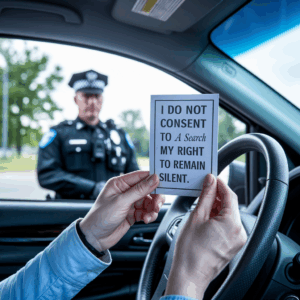Encountering a DUI checkpoint in Indiana can be intimidating, especially if you’re unsure of your rights or what to expect. These roadblocks are legal under both federal and Indiana state law, and they are frequently used as a tool to deter impaired driving. However, they must follow strict guidelines to be considered constitutional. Knowing your rights and responsibilities can help you navigate these situations calmly and protect yourself from unnecessary legal trouble.
Are DUI Checkpoints Legal in Indiana?
Yes, DUI checkpoints—also known as sobriety checkpoints—are legal in Indiana. While not all states permit them, the U.S. Supreme Court has upheld their constitutionality, and Indiana has adopted this enforcement method to help prevent alcohol-impaired driving. That said, law enforcement must adhere to specific protocols to ensure these checkpoints do not violate your Fourth Amendment rights against unreasonable searches and seizures.
What Happens at a DUI Checkpoint?
When approaching a DUI checkpoint in Indiana, here’s what typically occurs:
- Initial Stop: Officers will stop vehicles based on a neutral, pre-determined pattern (e.g., every third vehicle). You cannot be stopped arbitrarily.
- Brief Interaction: Law enforcement may ask for your license, registration, and proof of insurance. They will also observe your behavior, looking for signs of impairment such as slurred speech, the smell of alcohol, or erratic movements.
- Field Sobriety Testing: If an officer suspects you may be under the influence, you could be asked to perform field sobriety tests or submit to a breath test.
- Possible Arrest: If probable cause is established that you are driving under the influence, you may be arrested and taken in for further testing and processing.
These stops must be brief unless there is reasonable suspicion or probable cause to extend the encounter. If detained, you have rights—know them.

Your Rights at a DUI Checkpoint
Even though DUI checkpoints are legal, you are not without protection. Here's what you should know:
- You Have the Right to Remain Silent: You are required to provide your name, driver’s license, and vehicle documents, but you are not obligated to answer questions such as “Where are you coming from?” or “Have you been drinking?”
- You Do Not Have to Consent to a Search: Without probable cause or your consent, police cannot search your vehicle. Politely decline if asked to do so.
- You Can Refuse Field Sobriety Tests: In Indiana, you may refuse field sobriety tests; however, doing so can raise suspicion. Keep in mind, Indiana has implied consent laws for chemical tests.
- You Can Record the Encounter: As long as you are not interfering with the investigation, you have the right to record your interaction with police.
Remaining calm, respectful, and aware of your rights will help you manage the situation and protect your legal standing.
What Is “Implied Consent” in Indiana?
Indiana law operates under an implied consent rule, which means that by driving on Indiana roads, you have implicitly agreed to submit to chemical testing (such as a breath, blood, or urine test) if you are lawfully arrested for suspected DUI.
Refusing a chemical test can result in an automatic suspension of your driver's license, even if you are not ultimately convicted of a DUI. That suspension can last for up to one year for a first refusal, and up to two years for subsequent refusals.
Can You Turn Around to Avoid a Checkpoint?
Technically, yes—you can legally turn around to avoid a DUI checkpoint as long as you do so without violating any traffic laws. Law enforcement cannot stop you solely for avoiding a checkpoint, but if you make an illegal U-turn or commit another violation, they may have grounds to pull you over.
If you're near a checkpoint and choose to take another route, do it safely and legally to avoid giving officers a reason to investigate further.
What If You Are Arrested at a Checkpoint?
Being arrested at a DUI checkpoint is a serious matter that can result in criminal charges, license suspension, and long-term consequences. If this happens to you, the most important thing you can do is exercise your right to legal representation immediately.
An experienced criminal defense attorney can challenge the legality of the checkpoint, how it was conducted, or the validity of the arrest. Factors such as improper procedures, lack of probable cause, or constitutional violations may be grounds to suppress evidence or dismiss charges.
Protecting Your Rights in Indiana
Whether you’re stopped at a DUI checkpoint or arrested on suspicion of driving under the influence, understanding your rights is essential. Legal procedures at checkpoints must be followed precisely, and your attorney can review every aspect of your case for potential defense strategies.
At J.K. Sanchez Law, we understand the serious nature of DUI charges and the impact they can have on your life, your career, and your future. We’re committed to providing aggressive, knowledgeable defense for individuals facing DUI allegations in Indiana.
Need Help After a DUI Arrest?
If you were arrested at a DUI checkpoint or are concerned about how your rights were handled, don’t face the legal system alone. A strong defense starts with experienced legal counsel who understands Indiana DUI law inside and out.
Contact us today to schedule a confidential consultation and take the first step toward protecting your future.



